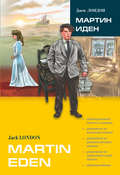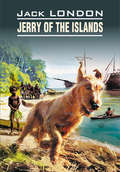
Джек Лондон
A Daughter of the Snows
"McKinley."
She favored him with a smile. "Thank you, cookie, you're a trump. Now! 'Ere's a go, gents! Take it standing. The Queen, Gawd bless 'er, and Bill McKinley!"
"Bottoms up!" thundered Jake Cornell, and the mugs smote the table with clanging rims.
Vance Corliss discovered himself amused and interested. According to Frona, he mused ironically, – this was learning life, was adding to his sum of human generalizations. The phrase was hers, and he rolled it over a couple of times. Then, again, her engagement with St. Vincent crept into his thought, and he charmed the Virgin by asking her to sing. But she was coy, and only after Bishop had rendered the several score stanzas of "Flying Cloud" did she comply. Her voice, in a weakly way, probably registered an octave and a half; below that point it underwent strange metamorphoses, while on the upper levels it was devious and rickety. Nevertheless she sang "Take Back Your Gold" with touching effect, which brought a fiery moisture into the eyes of the Fraction King, who listened greedily, for the time being experiencing unwonted ethical yearnings.
The applause was generous, followed immediately by Bishop, who toasted the singer as the "Enchantress of Bow Bells," to the reverberating "bottoms up!" of Jake Cornell.
Two hours later, Frona Welse rapped. It was a sharp, insistent rap, penetrating the din within and bringing Corliss to the door.
She gave a glad little cry when she saw who it was. "Oh; it is you, Vance! I didn't know you lived here."
He shook hands and blocked the doorway with his body. Behind him the Virgin was laughing and Jake Cornell roaring:
"Oh, cable this message along the track;
The Prod's out West, but he's coming back;
Put plenty of veal for one on the rack,
Trolla lala, la la la, la la!"
"What is it?" Vance questioned. "Anything up?"
"I think you might ask me in." There was a hint of reproach in Frona's voice, and of haste. "I blundered through the ice, and my feet are freezing."
"O Gawd!" in the exuberant tones of the Virgin, came whirling over Vance's shoulder, and the voices of Blanche and Bishop joining in a laugh against Cornell, and that worthy's vociferous protestations. It seemed to him that all the blood of his body had rushed into his face. "But you can't come in, Frona. Don't you hear them?"
"But I must," she insisted. "My feet are freezing."
With a gesture of resignation he stepped aside and closed the door after her. Coming suddenly in from the darkness, she hesitated a moment, but in that moment recovered her sight and took in the scene. The air was thick with tobacco smoke, and the odor of it, in the close room, was sickening to one fresh from the pure outside. On the table a column of steam was ascending from the big mixing-pan. The Virgin, fleeing before Cornell, was defending herself with a long mustard spoon. Evading him and watching her chance, she continually daubed his nose and cheeks with the yellow smear. Blanche had twisted about from the stove to see the fun, and Del Bishop, with a mug at rest half-way to his lips, was applauding the successive strokes. The faces of all were flushed.
Vance leaned nervelessly against the door. The whole situation seemed so unthinkably impossible. An insane desire to laugh came over him, which resolved itself into a coughing fit. But Frona, realizing her own pressing need by the growing absence of sensation in her feet, stepped forward.
"Hello, Del!" she called.
The mirth froze on his face at the familiar sound and he slowly and unwilling turned his head to meet her. She had slipped the hood of her parka back, and her face, outlined against the dark fur, rosy with the cold and bright, was like a shaft of the sun shot into the murk of a boozing-ken. They all knew her, for who did not know Jacob Welse's daughter? The Virgin dropped the mustard-spoon with a startled shriek, while Cornell, passing a dazed hand across his yellow markings and consummating the general smear, collapsed on the nearest stool. Cariboo Blanche alone retained her self-possession, and laughed softly.
Bishop managed to articulate "Hello!" but was unable to stave off the silence which settled down.
Frona waited a second, and then said, "Good-evening, all."
"This way." Vance had recovered himself, and seated her by the stove opposite Blanche. "Better get your things off quickly, and be careful of the heat. I'll see what I can find for you."
"Some cold water, please," she asked. "It will take the frost out.
Del will get it."
"I hope it is not serious?"
"No." She shook her head and smiled up to him, at the same time working away at her ice-coated moccasins. "There hasn't been time for more than surface-freezing. At the worst the skin will peel off."
An unearthly silence brooded in the cabin, broken only by Bishop filling a basin from the water-bucket, and by Corliss seeking out his smallest and daintiest house-moccasins and his warmest socks.
Frona, rubbing her feet vigorously, paused and looked up. "Don't let me chill the festivities just because I'm cold," she laughed. "Please go on."
Jake Cornell straightened up and cleared his throat inanely, and the Virgin looked over-dignified; but Blanche came over and took the towel out of Frona's hands.
"I wet my feet in the same place," she said, kneeling down and bringing a glow to the frosted feet.
"I suppose you can manage some sort of a fit with them. Here!" Vance tossed over the house-moccasins and woollen wrappings, which the two women, with low laughs and confidential undertones, proceeded to utilize.
"But what in the world were you doing on trail, alone, at this time of night?" Vance asked. In his heart he was marvelling at the coolness and pluck with which she was carrying off the situation.
"I know beforehand that you will censure me," she replied, helping Blanche arrange the wet gear over the fire. "I was at Mrs. Stanton's; but first, you must know, Miss Mortimer and I are staying at the Pently's for a week. Now, to start fresh again. I intended to leave Mrs. Stanton's before dark; but her baby got into the kerosene, her husband had gone down to Dawson, and – well, we weren't sure of the baby up to half an hour ago. She wouldn't hear of me returning alone; but there was nothing to fear; only I had not expected soft ice in such a snap."
"How'd you fix the kid?" Del asked, intent on keeping the talk going now that it had started.
"Chewing tobacco." And when the laughter had subsided, she went on:
"There wasn't any mustard, and it was the best I could think of.
Besides, Matt McCarthy saved my life with it once, down at Dyea when I had the croup. But you were singing when I came in," she suggested.
"Do go on."
Jake Cornell hawed prodigiously. "And I got done."
"Then you, Del. Sing 'Flying Cloud' as you used to coming down the river."
"Oh, 'e 'as!" said the Virgin.
"Then you sing. I am sure you do."
She smiled into the Virgin's eyes, and that lady delivered herself of a coster ballad with more art than she was aware. The chill of Frona's advent was quickly dissipated, and song and toast and merriment went round again. Nor was Frona above touching lips to the jelly glass in fellowship; and she contributed her quota by singing "Annie Laurie" and "Ben Bolt." Also, but privily, she watched the drink saturating the besotted souls of Cornell and the Virgin. It was an experience, and she was glad of it, though sorry in a way for Corliss, who played the host lamely.
But he had little need of pity. "Any other woman – " he said to himself a score of times, looking at Frona and trying to picture numerous women he had known by his mother's teapot, knocking at the door and coming in as Frona had done. Then, again, it was only yesterday that it would have hurt him, Blanche's rubbing her feet; but now he gloried in Frona's permitting it, and his heart went out in a more kindly way to Blanche. Perhaps it was the elevation of the liquor, but he seemed to discover new virtues in her rugged face.
Frona had put on her dried moccasins and risen to her feet, and was listening patiently to Jake Cornell, who hiccoughed a last incoherent toast.
"To the – hic – man," he rumbled, cavernously, "the man – hic – that made – that made – "
"The blessed country," volunteered the Virgin.
"True, my dear – hic. To the man that made the blessed country.
To – hic – to Jacob Welse!"
"And a rider!" Blanche cried. "To Jacob Welse's daughter!"
"Ay! Standing! And bottoms up!"
"Oh! she's a jolly good fellow," Del led off, the drink ruddying his cheek.
"I'd like to shake hands with you, just once," Blanche said in a low voice, while the rest were chorusing.
Frona slipped her mitten, which she had already put on, and the pressure was firm between them.
"No," she said to Corliss, who had put on his cap and was tying the ear-flaps; "Blanche tells me the Pently's are only half a mile from here. The trail is straight. I'll not hear of any one accompanying me.
"No!" This time she spoke so authoritatively that he tossed his cap into the bunk. "Good-night, all!" she called, sweeping the roisterers with a smile.
But Corliss saw her to the door and stepped outside. She glanced up to him. Her hood was pulled only partly up, and her face shone alluringly under the starlight.
"I – Frona.. I wish – "
"Don't be alarmed," she whispered. "I'll not tell on you, Vance."
He saw the mocking glint in her eyes, but tried to go on. "I wish to explain just how – "
"No need. I understand. But at the same time I must confess I do not particularly admire your taste – "
"Frona!" The evident pain in his voice reached her.
"Oh, you big foolish!" she laughed. "Don't I know? Didn't Blanche tell me she wet her feet?"
Corliss bowed his head. "Truly, Frona, you are the most consistent woman I ever met. Furthermore," with a straightening of his form and a dominant assertion in his voice, "this is not the last."
She tried to stop him, but he continued. "I feel, I know that things will turn out differently. To fling your own words back at you, all the factors have not been taken into consideration. As for St. Vincent.. I'll have you yet. For that matter, now could not be too soon!"
He flashed out hungry arms to her, but she read quicker than he moved, and, laughing, eluded him and ran lightly down the trail.
"Come back, Frona! Come back!" he called, "I am sorry."
"No, you're not," came the answer. "And I'd be sorry if you were.
Good-night."
He watched her merge into the shadows, then entered the cabin. He had utterly forgotten the scene within, and at the first glance it startled him. Cariboo Blanche was crying softly to herself. Her eyes were luminous and moist, and, as he looked, a lone tear stole down her cheek. Bishop's face had gone serious. The Virgin had sprawled head and shoulders on the table, amid overturned mugs and dripping lees, and Cornell was tittubating over her, hiccoughing, and repeating vacuously, "You're all right, my dear. You're all right."
But the Virgin was inconsolable. "O Gawd! Wen I think on wot is, an' was.. an' no fault of mine. No fault of mine, I tell you!" she shrieked with quick fierceness. "'Ow was I born, I ask? Wot was my old man? A drunk, a chronic. An' my old woman? Talk of Whitechapel! 'Oo guv a cent for me, or 'ow I was dragged up? 'Oo cared a rap, I say? 'Oo cared a rap?"
A sudden revulsion came over Corliss. "Hold your tongue!" he ordered.
The Virgin raised her head, her loosened hair streaming about her like a Fury's. "Wot is she?" she sneered. "Sweet'eart?"
Corliss whirled upon her savagely, face white and voice shaking with passion.
The Virgin cowered down and instinctively threw up her hands to protect her face. "Don't 'it me, sir!" she whined. "Don't 'it me!"
He was frightened at himself, and waited till he could gather control.
"Now," he said, calmly, "get into your things and go. All of you.
Clear out. Vamose."
"You're no man, you ain't," the Virgin snarled, discovering that physical assault was not imminent.
But Corliss herded her particularly to the door, and gave no heed.
"A-turning ladies out!" she sniffed, with a stumble over the threshold;
"No offence," Jake Cornell muttered, pacifically; "no offence."
"Good-night. Sorry," Corliss said to Blanche, with the shadow of a forgiving smile, as she passed out.
"You're a toff! That's wot you are, a bloomin' toff!" the Virgin howled back as he shut the door.
He looked blankly at Del Bishop and surveyed the sodden confusion on the table. Then he walked over and threw himself down on his bunk. Bishop leaned an elbow on the table and pulled at his wheezy pipe. The lamp smoked, flickered, and went out; but still he remained, filling his pipe again and again and striking endless matches.
"Del! Are you awake?" Corliss called at last.
Del grunted.
"I was a cur to turn them out into the snow. I am ashamed."
"Sure," was the affirmation.
A long silence followed. Del knocked the ashes out and raised up.
"'Sleep?" he called.
There was no reply, and he walked to the bunk softly and pulled the blankets over the engineer.
CHAPTER XXI
"Yes; what does it all mean?" Corliss stretched lazily, and cocked up his feet on the table. He was not especially interested, but Colonel Trethaway persisted in talking seriously.
"That's it! The very thing – the old and ever young demand which man slaps into the face of the universe." The colonel searched among the scraps in his note-book. "See," holding up a soiled slip of typed paper, "I copied this out years ago. Listen. 'What a monstrous spectre is this man, this disease of the agglutinated dust, lifting alternate feet or lying drugged with slumber; killing, feeding, growing, bringing forth small copies of himself; grown up with hair like grass, fitted with eyes that glitter in his face; a thing to set children screaming. Poor soul, here for so little, cast among so many hardships, filled with desires so incommensurate and so inconsistent; savagely surrounded, savagely descended, irremediably condemned to prey upon his fellow-lives. Infinitely childish, often admirably valiant, often touchingly kind; sitting down to debate of right or wrong and the attributes of the deity; rising up to battle for an egg or die for an idea!'
"And all to what end?" he demanded, hotly, throwing down the paper, "this disease of the agglutinated dust?"
Corliss yawned in reply. He had been on trail all day and was yearning for between-blankets.
"Here am I, Colonel Trethaway, modestly along in years, fairly well preserved, a place in the community, a comfortable bank account, no need to ever exert myself again, yet enduring life bleakly and working ridiculously with a zest worthy of a man half my years. And to what end? I can only eat so much, smoke so much, sleep so much, and this tail-dump of earth men call Alaska is the worst of all possible places in the matter of grub, tobacco, and blankets."
"But it is the living strenuously which holds you," Corliss interjected.
"Frona's philosophy," the colonel sneered.
"And my philosophy, and yours."
"And of the agglutinated dust – "
"Which is quickened with a passion you do not take into account, – the passion of duty, of race, of God!"
"And the compensation?" Trethaway demanded.
"Each breath you draw. The Mayfly lives an hour."
"I don't see it."
"Blood and sweat! Blood and sweat! You cried that after the rough and tumble in the Opera House, and every word of it was receipt in full."
"Frona's philosophy."
"And yours and mine."
The colonel threw up his shoulders, and after a pause confessed. "You see, try as I will, I can't make a pessimist out of myself. We are all compensated, and I more fully than most men. What end? I asked, and the answer forthcame: Since the ultimate end is beyond us, then the immediate. More compensation, here and now!"
"Quite hedonistic."
"And rational. I shall look to it at once. I can buy grub and blankets for a score; I can eat and sleep for only one; ergo, why not for two?"
Corliss took his feet down and sat up. "In other words?"
"I shall get married, and – give the community a shock. Communities like shocks. That's one of their compensations for being agglutinative."
"I can't think of but one woman," Corliss essayed tentatively, putting out his hand.
Trethaway shook it slowly. "It is she."
Corliss let go, and misgiving shot into his face. "But St. Vincent?"
"Is your problem, not mine."
"Then Lucile – ?"
"Certainly not. She played a quixotic little game of her own and botched it beautifully."
"I – I do not understand." Corliss brushed his brows in a dazed sort of way.
Trethaway parted his lips in a superior smile. "It is not necessary that you should. The question is, Will you stand up with me?"
"Surely. But what a confoundedly long way around you took. It is not your usual method."
"Nor was it with her," the colonel declared, twisting his moustache proudly.
A captain of the North-West Mounted Police, by virtue of his magisterial office, may perform marriages in time of stress as well as execute exemplary justice. So Captain Alexander received a call from Colonel Trethaway, and after he left jotted down an engagement for the next morning. Then the impending groom went to see Frona. Lucile did not make the request, he hastened to explain, but – well, the fact was she did not know any women, and, furthermore, he (the colonel) knew whom Lucile would like to ask, did she dare. So he did it upon his own responsibility. And coming as a surprise, he knew it would be a great joy to her.
Frona was taken aback by the suddenness of it. Only the other day, it was, that Lucile had made a plea to her for St. Vincent, and now it was Colonel Trethaway! True, there had been a false quantity somewhere, but now it seemed doubly false. Could it be, after all, that Lucile was mercenary? These thoughts crowded upon her swiftly, with the colonel anxiously watching her face the while. She knew she must answer quickly, yet was distracted by an involuntary admiration for his bravery. So she followed, perforce, the lead of her heart, and consented.
Yet the whole thing was rather strained when the four of them came together, next day, in Captain Alexander's private office. There was a gloomy chill about it. Lucile seemed ready to cry, and showed a repressed perturbation quite unexpected of her; while, try as she would, Frona could not call upon her usual sympathy to drive away the coldness which obtruded intangibly between them. This, in turn, had a consequent effect on Vance, and gave a certain distance to his manner which forced him out of touch even with the colonel.
Colonel Trethaway seemed to have thrown twenty years off his erect shoulders, and the discrepancy in the match which Frona had felt vanished as she looked at him. "He has lived the years well," she thought, and prompted mysteriously, almost with vague apprehension she turned her eyes to Corliss. But if the groom had thrown off twenty years, Vance was not a whit behind. Since their last meeting he had sacrificed his brown moustache to the frost, and his smooth face, smitten with health and vigor, looked uncommonly boyish; and yet, withal, the naked upper lip advertised a stiffness and resolution hitherto concealed. Furthermore, his features portrayed a growth, and his eyes, which had been softly firm, were now firm with the added harshness or hardness which is bred of coping with things and coping quickly, – the stamp of executiveness which is pressed upon men who do, and upon all men who do, whether they drive dogs, buck the sea, or dictate the policies of empires.
When the simple ceremony was over, Frona kissed Lucile; but Lucile felt that there was a subtle something wanting, and her eyes filled with unshed tears. Trethaway, who had felt the aloofness from the start, caught an opportunity with Frona while Captain Alexander and Corliss were being pleasant to Mrs. Trethaway.
"What's the matter, Frona?" the colonel demanded, bluntly. "I hope you did not come under protest. I am sorry, not for you, because lack of frankness deserves nothing, but for Lucile. It is not fair to her."
"There has been a lack of frankness throughout." Her voice trembled. "I tried my best, – I thought I could do better, – but I cannot feign what I do not feel. I am sorry, but I.. I am disappointed. No, I cannot explain, and to you least of all."
"Let's be above-board, Frona. St. Vincent's concerned?"
She nodded.
"And I can put my hand right on the spot. First place," he looked to the side and saw Lucile stealing an anxious glance to him, – "first place, only the other day she gave you a song about St. Vincent. Second place, and therefore, you think her heart's not in this present proposition; that she doesn't care a rap for me; in short, that she's marrying me for reinstatement and spoils. Isn't that it?"
"And isn't it enough? Oh, I am disappointed, Colonel Trethaway, grievously, in her, in you, in myself."
"Don't be a fool! I like you too well to see you make yourself one. The play's been too quick, that is all. Your eye lost it. Listen. We've kept it quiet, but she's in with the elect on French Hill. Her claim's prospected the richest of the outfit. Present indication half a million at least. In her own name, no strings attached. Couldn't she take that and go anywhere in the world and reinstate herself? And for that matter, you might presume that I am marrying her for spoils. Frona, she cares for me, and in your ear, she's too good for me. My hope is that the future will make up. But never mind that – haven't got the time now.
"You consider her affection sudden, eh? Let me tell you we've been growing into each other from the time I came into the country, and with our eyes open. St. Vincent? Pshaw! I knew it all the time. She got it into her head that the whole of him wasn't worth a little finger of you, and she tried to break things up. You'll never know how she worked with him. I told her she didn't know the Welse, and she said so, too, after. So there it is; take it or leave it."
"But what do you think about St. Vincent?"
"What I think is neither here nor there; but I'll tell you honestly that I back her judgment. But that's not the point. What are you going to do about it? about her? now?"
She did not answer, but went back to the waiting group. Lucile saw her coming and watched her face.
"He's been telling you – ?"
"That I am a fool," Frona answered. "And I think I am." And with a smile, "I take it on faith that I am, anyway. I – I can't reason it out just now, but.."
Captain Alexander discovered a prenuptial joke just about then, and led the way over to the stove to crack it upon the colonel, and Vance went along to see fair play.
"It's the first time," Lucile was saying, "and it means more to me, so much more, than to.. most women. I am afraid. It is a terrible thing for me to do. But I do love him, I do!" And when the joke had been duly digested and they came back, she was sobbing, "Dear, dear Frona."
It was just the moment, better than he could have chosen; and capped and mittened, without knocking, Jacob Welse came in.
"The uninvited guest," was his greeting. "Is it all over? So?" And he swallowed Lucile up in his huge bearskin. "Colonel, your hand, and your pardon for my intruding, and your regrets for not giving me the word. Come, out with them! Hello, Corliss! Captain Alexander, a good day."
"What have I done?" Frona wailed, received the bear-hug, and managed to press his hand till it almost hurt.
"Had to back the game," he whispered; and this time his hand did hurt.
"Now, colonel, I don't know what your plans are, and I don't care. Call them off. I've got a little spread down to the house, and the only honest case of champagne this side of Circle. Of course, you're coming, Corliss, and – " His eye roved past Captain Alexander with hardly a pause.
"Of course," came the answer like a flash, though the Chief Magistrate of the Northwest had had time to canvass the possible results of such unofficial action. "Got a hack?"
Jacob Welse laughed and held up a moccasined foot. "Walking be – chucked!" The captain started impulsively towards the door. "I'll have the sleds up before you're ready. Three of them, and bells galore!"
So Trethaway's forecast was correct, and Dawson vindicated its agglutinativeness by rubbing its eyes when three sleds, with three scarlet-tuniced policemen swinging the whips, tore down its main street; and it rubbed its eyes again when it saw the occupants thereof.
"We shall live quietly," Lucile told Frona. "The Klondike is not all the world, and the best is yet to come."
But Jacob Welse said otherwise. "We've got to make this thing go," he said to Captain Alexander, and Captain Alexander said that he was unaccustomed to backing out.
Mrs. Schoville emitted preliminary thunders, marshalled the other women, and became chronically seismic and unsafe.
Lucile went nowhere save to Frona's. But Jacob Welse, who rarely went anywhere, was often to be found by Colonel Trethaway's fireside, and not only was he to be found there, but he usually brought somebody along. "Anything on hand this evening?" he was wont to say on casual meeting. "No? Then come along with me." Sometimes he said it with lamb-like innocence, sometimes with a challenge brooding under his bushy brows, and rarely did he fail to get his man. These men had wives, and thus were the germs of dissolution sown in the ranks of the opposition.
Then, again, at Colonel Trethaway's there was something to be found besides weak tea and small talk; and the correspondents, engineers, and gentlemen rovers kept the trail well packed in that direction, though it was the Kings, to a man, who first broke the way. So the Trethaway cabin became the centre of things, and, backed commercially, financially, and officially, it could not fail to succeed socially.
The only bad effect of all this was to make the lives of Mrs. Schoville and divers others of her sex more monotonous, and to cause them to lose faith in certain hoary and inconsequent maxims. Furthermore, Captain Alexander, as highest official, was a power in the land, and Jacob Welse was the Company, and there was a superstition extant concerning the unwisdom of being on indifferent terms with the Company. And the time was not long till probably a bare half-dozen remained in outer cold, and they were considered a warped lot, anyway.






